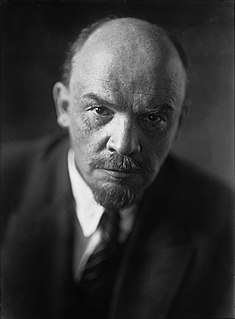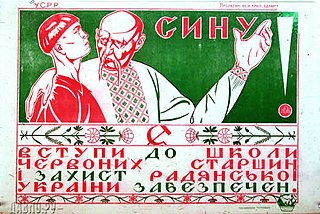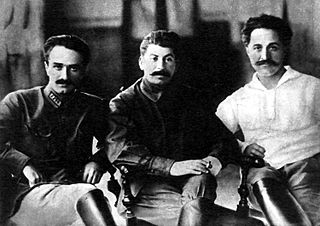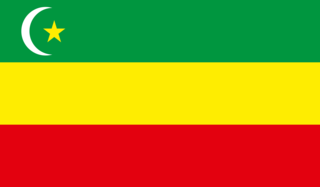Related Research Articles

Leninism is a political ideology developed by Russian Marxist revolutionary Vladimir Lenin that proposes the establishment of the dictatorship of the proletariat led by a revolutionary vanguard party, as the political prelude to the establishment of communism. The function of the Leninist vanguard party is to provide the working classes with the political consciousness and revolutionary leadership necessary to depose capitalism in the Russian Empire (1721–1917). Leninist revolutionary leadership is based upon The Communist Manifesto (1848) identifying the communist party as "the most advanced and resolute section of the working class parties of every country; that section which pushes forward all others." As the vanguard party, the Bolsheviks viewed history through the theoretical framework of dialectical materialism, which sanctioned political commitment to the successful overthrow of capitalism, and then to instituting socialism; and, as the revolutionary national government, to realize the socio-economic transition by all means.

The ten years 1917–1927 saw a radical transformation of the Russian Empire into a socialist state, the Soviet Union. Soviet Russia covers 1917–1922 and Soviet Union covers the years 1922 to 1991. After the Russian Civil War (1917–1923), the Bolsheviks took control. They were dedicated to a version of Marxism developed by Vladimir Lenin. It promised the workers would rise, destroy capitalism, and create a socialist utopia under the leadership of the Communist Party of the Soviet Union. The awkward problem was the small proletariat, in an overwhelmingly peasant society with limited industry and a very small middle class. Following the February Revolution in 1917 that deposed Nicholas II of Russia, a short-lived provisional government gave way to Bolsheviks in the October Revolution. The Bolshevik Party was renamed the Russian Communist Party (RCP).

The Georgian Soviet Socialist Republic was one of the republics of the Soviet Union from its second occupation in 1921 to its independence in 1991. Coterminous with the present-day republic of Georgia, it was based on the traditional territory of Georgia, which had existed as a series of independent states in the Caucasus prior to the first occupation of annexation in the course of the 19th century. The Georgian SSR was formed in 1921 and subsequently incorporated in the Soviet Union in 1922. Until 1936 it was a part of the Transcaucasian Socialist Federative Soviet Republic, which existed as a union republic within the USSR. From November 18, 1989, the Georgian SSR declared its sovereignty over Soviet laws. The republic was renamed the Republic of Georgia on November 14, 1990, and subsequently became independent before the dissolution of the Soviet Union on April 9, 1991, whereupon each former SSR became a sovereign state.

Korenizatsiya was an early policy of the Soviet Union for the integration of non-Russian nationalities into the governments of their specific soviet republics. In the 1920s the policy of korenization (nativization) promoted representatives of the titular nation, and their national minorities, into the lower administrative-levels of the local government, bureaucracy, and nomenklatura of their Soviet republics. In Russian, the term korenizacija derives from korennoje naselenije.
Russian Fascism: Traditions, Tendencies, Movements is a 2001 book by Stephen D. Shenfield.
National delimitation in the Union of Soviet Socialist Republics was the process of specifying well-defined national territorial units from the ethnic diversity of the Union of Soviet Socialist Republics (USSR) and its subregions. The Russian-language term for this Soviet state policy was razmezhevanie, which is variously translated in English-language literature as "national-territorial delimitation" (NTD), "demarcation", or "partition". National delimitation formed part of a broader process of changes in administrative-territorial division, which also changed the boundaries of territorial units, but was not necessarily linked to national or ethnic considerations. National delimitation in the USSR was distinct from nation-building, which typically referred to the policies and actions implemented by the government of a national territorial unit after delimitation. In most cases national delimitation in the USSR was followed by korenizatsiya (indigenization).

The Union of Soviet Socialist Republics (USSR) was a federation made up of 15 Soviet socialist republics, and existed from 1922 until its dissolution in 1991. Six of the 15 republics had a Muslim majority: Azerbaijan, Kazakhstan, Kirghizia, Tajikistan, Turkmenistan, and Uzbekistan. There was also a large Muslim population in the Volga-Ural region and in the northern Caucasus region of the Russian Soviet Federative Socialist Republic. Many Tatar Muslims also lived in Siberia and other regions.

The Socialist Soviet Republic of Abkhazia was a short-lived republic within the Caucasus region of the Soviet Union that covered the territory of Abkhazia, and existed from 31 March 1921 to 19 February 1931. Formed in the aftermath of the Red Army invasion of Georgia in 1921, it was independent until 16 December 1921 when it agreed to a treaty that united it with the Georgian Soviet Socialist Republic. The SSR Abkhazia was similar to an autonomous Soviet republic, though it retained nominal independence from Georgia and was given certain features only full union republics had, like its own military units. Through its status as a "treaty republic" with Georgia, Abkhazia joined the Transcaucasian Soviet Federative Socialist Republic, which united Armenian, Azerbaijani, and Georgian SSRs into one federal unit when the latter was formed in 1922. The SSR Abkhazia was abolished in 1931 and replaced with the Abkhaz Autonomous Soviet Socialist Republic within the Georgian SSR.
National communism refers to the various forms in which communism has been adopted and/or implemented by leaders in different countries using aspects of nationalism or national identity to form a policy independent from communist internationalism. National communism has been used to describe movements and regimes that have sought to form a distinctly unique variant of communism based upon national conditions rather than following policies set by other communist nations, such as the Soviet Union. In each independent state, empire, or dependency, the relationship between class and nation had its own particularities. The Ukrainian communists Vasil Shakhrai and Mazlakh and then Muslim Sultan Galiyev considered the interests of the Bolshevik Russian state at odds with those of their countries. Communist regimes that have attempted to pursue independent foreign and domestic policies that conflicted with the interests of the Soviet Union have been described as examples of "national communism", however this form of national communism differs from communist regimes/movements that embrace nationalist rhetoric. Examples include Josip Broz Tito and his independent direction that led Yugoslavia away from the Soviet Union, Imre Nagy's anti-soviet liberal communism, Alexander Dubček's Socialism with a human face and János Kádár's Goulash Communism.

The Georgian affair of 1922 was a political conflict within the Soviet leadership about the way in which social and political transformation was to be achieved in the Georgian SSR. The dispute over Georgia, which arose shortly after the forcible Sovietization of the country and peaked in the latter part of 1922, involved local Georgian Bolshevik leaders, led by Filipp Makharadze and Budu Mdivani, on one hand, and their de facto superiors from the Russian SFSR, particularly Joseph Stalin and Grigol Ordzhonikidze, on the other hand. The content of this dispute was complex, involving the Georgians' desire to preserve autonomy from Moscow and the differing interpretations of Bolshevik nationality policies, and especially those specific to Georgia. One of the main points at issue was Moscow's decision to amalgamate Georgia, Armenia and Azerbaijan into Transcaucasian SFSR, a move that was staunchly opposed by the Georgian leaders who urged for their republic a full-member status within the Soviet Union.
The People's Commissariat of Nationalities, an organisation functioning from 1917 to 1924 in the early Soviet period of Russian and Soviet history, dealt with non-Russian nationalities. Its head, Joseph Stalin, as the People's Commissar of Nationalities (1917–23), served as a member of the Council of People's Commissars.

Alash Autonomy was a Kazakh state that existed between 1917 and 1920, on approximately the territory of the present-day Republic of Kazakhstan. The capital city was Semey, then known as "Alash-qala".

Marxism and the National Question is a short work of Marxist theory written by Joseph Stalin in January 1913 while living in Vienna. First published as a pamphlet and frequently reprinted, the essay by the ethnic Georgian Stalin was regarded as a seminal contribution to Marxist analysis of the nature of nationality and helped to establish his reputation as an expert on the topic. Stalin would later become the first People's Commissar of Nationalities following the victory of the Bolshevik Party in the October Revolution of 1917.
Soviet nationality and citizenship law controlled who was considered a citizen of the Union of Soviet Socialist Republics, and by extension, each of the Republics of the Soviet Union, during that country's existence. The nationality laws were only in rough form from about 1913 to 1923, taking more definite form in 1924. There were several major changes in the nationality law, especially in 1931, 1938, and 1978. Soviet law originally expanded the bounds of jus sanguinis and citizenship by residence more than was common among European countries, before tending to gradually retract from that over time. Soviet citizenship law was also used as a political tool to expand the number of Soviet citizens globally, increase military conscription pools, and punish dissenters or even entire ethnic groups.
Conservatism in Russia is a broad system of political beliefs in Russia that is characterized by support for Christian values, Russian imperialism, statism, economic intervention, advocacy for the historical Russian sphere of influence and a rejection of Western culture.

This is a select bibliography of post World War II English language books and journal articles about the Revolutionary and Civil War era of Russian (Soviet) history. The sections "General Surveys" and "Biographies" contain books; other sections contain both books and journal articles. Book entries may have references to reviews published in English language academic journals or major newspapers when these could be considered helpful.

This is a select bibliography of post World War II English language books and journal articles about Stalinism and the Stalinist era of Soviet history. Book entries have references to journal reviews about them when helpful and available.

This is a select bibliography of English language books and journal articles about the Post-Stalinist era of Soviet history. A brief selection of English translations of primary sources is included. The sections "General Surveys" and "Biographies" contain books; other sections contain both books and journal articles. Book entries have references to journal articles and reviews about them when helpful.
Theories on the existence of nationalism in the Middle Ages may belong to the general paradigms of ethnosymbolism and primordialism or perennialism. Several scholars of nationalism support the existence of nationalism in the Middle Ages. This school of thought differs from modernism, which suggests that nationalism developed after the late 18th century and the French Revolution.

Below are a list of post World War II scholarly books and journal articles written in or translated into English about communism. Items on this list should be considered a non-exhaustive list of reliable sources related to the theory and practice of communism in its different forms.
References
- ↑ "Smith, Jeremy, 1964-". id.loc.gov. Retrieved April 11, 2021.
- ↑ "ICCEES Professor Jeremy Smith" . Retrieved 29 December 2020.
- ↑ "Jeremy Smith".
- 1 2 "The Bolsheviks and the National Question 1917-23 | Reviews in History". Reviews.history.ac.uk.
- ↑ Глебов, Сергей (2001). "The Bolsheviks and the National Question, 1917–23 by Jeremy Smith". Ab Imperio. 2001 (1–2): 474–477. doi:10.1353/imp.2001.0030. S2CID 160128242.
- ↑ "Jeremy Smith. The Bolsheviks and the National Question, 1917–23. (Studies in Russia and East Europe.) New York: St. Martin's. 1999. Pp. xvii, 281. $72.00". The American Historical Review. June 2000. doi:10.1086/ahr/105.3.1046.
- ↑ Atabaki, Touraj (2002). "The Bolsheviks and the National Question, 1917–23 . By Smith, Jeremy. [Studies in Russia and East Europe.] Macmillan, Basingstoke [etc.], in assoc. with School of Slavonic and East European Studies, University of London; St. Martin's Press, Inc., New York 1999. xviii, 281 pp. £45.00". International Review of Social History. 47 (1): 115–139. doi: 10.1017/S002085900149050X .
- ↑ Altstadt, Audrey L. (2015). "Jeremy Smith. Red Nations: The Nationalities Experience in and after the USSR". The American Historical Review. 120 (1): 358–359. doi:10.1093/ahr/120.1.358.
- ↑ Storm, Karli-Jo (2015). "Red Nations: The Nationalities Experience in and after the USSR". Journal of Borderlands Studies. 30 (2): 285–286. doi:10.1080/08865655.2015.1046473. S2CID 143299251.
- ↑ Walke, Anika (2014). "Red Nations: The Nationalities Experience in and after the USSR by Jeremy Smith". Ab Imperio. 2014 (2): 455–459. doi:10.1353/imp.2014.0033. S2CID 162398558.